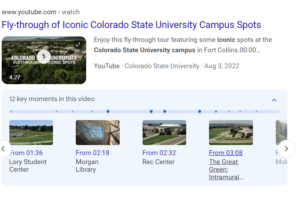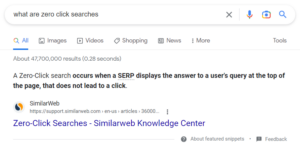The search engine landscape is constantly evolving and adapting to changes in technology and user behavior. The rate with which search engines like Google are making core algorithm updates has been increasing, too. What worked last year may not be so effective this year. While it is difficult to predict specific trends for SEO and search engine marketing with certainty, but based on what we saw last year, we are presenting some SEO trends that are likely to continue in 2023. More importantly, we also provide some actionable tips for you to align your SEO efforts with these trends.
Multimedia search
With the integration of visual search in many search engines and the increasing use of image-based searches, it’s become more important to optimize images and videos to improve their visibility in search results.
Google has been displaying results from all sorts of sources which include YouTube, Pinterest, Twitter and sometimes TikTok. Most experts are predicting that this trend will continue.
Following are some of the impactful things you could be doing to optimize for multimedia search:
Embed optimized videos: Using keyword-rich names for your video files, titles and descriptions is a great starting point. Google has been serving highlights and clips from embedded videos in the search results for a while now:

It’ll be quite beneficial to optimize key highlights in your video with appropriate keywords instead of letting the search engine do it.
Alt-text: Use of alt-text to describe images is important not only for image search, but also for visually-impaired users.
Using search in conjunction with social media: Younger audiences rely heavily on platforms such as TikTok and Instagram for their searches. This trend was acknowledged by Google last year when they reported that nearly 40% of Gen Z already prefer TikTok and Instagram over Google Search.
It could be extremely valuable for a brand to have a robust strategy in place for these social media platforms. Whether it is using keyword-rich captions or adding alt-text to images, an integrated approach to search appears to be the way forward.
Personalization
Personalization takes user experience to the next level. With the increasing use of AI and machine learning by search engines, it is important for brands to focus on creating personalized content and experiences for their users. Search engines also take into account users’ location, device and search history for displaying search results.
Whether it is serving content in multiple languages or having landing pages dedicated to geo-locations that you serve, personalized content will become ever-important in the coming years. The growth of TikTok and Instagram as search engines is, in large part, due to these platforms’ algorithms providing authentic, user-centric experiences based on search history, interests and affinity.
Content creators should have a list of frequently-searched queries pertaining to their brands. These search phrases should strategically be placed in post captions, video titles, subtitles and descriptions. A word of caution here: Stuffing or forcing keywords makes for a bad user experience and is almost always frowned-upon by search engines.
Page speed, UX and Technical SEO
Page speed has been an important factor in SEO over the years as it directly impacts the user experience. Monitoring your webpages’ speeds on Page Speed Insights and Core Web Vitals in Google Search Console is critical.
Having content that is mobile-friendly does impact how search engines rank your web pages, and it will continue to do so with higher smartphone penetration and faster internet speeds.
How well is your website structured? How easy is it to find information on your website? These are some of the questions that you need to focus on. In addition, is your website secure? Are you allowing all important sections of your website to be indexed by Google? All of the above help in delivering a pleasant experience to your end-user that should be the focus of SEOs in 2023.
Zero-click searches
We have been seeing the rise of zero-click searches on Google for some years now. These are the type of search results that provide users with the information they need without having to click-through to a website. These results are served as featured snippets, knowledge panels, embedded maps, etc.

It’s become important for brands to focus on maximizing their visibility in these types of results. Although these results take away the click-through aspect of a search, these are important for a top-of-the-mind awareness for a brand. Here are some steps you could take to increase your content’s chances of being in a zero-click:
- Strive to have a fast-loading, mobile-friendly website
- Structure content with headings, sub-headings, sitemaps, custom search, etc.
- Provide a summary of your informational content. Having an index for long-form content pieces could also help
- Update your Google Business listings
E-E-A-T
Expertise, Authority, Trustworthiness is a concept that Google’s search quality raters use to evaluate the quality of a website. Recently, Google modified its search rater’s guidelines to include the term ‘Experience.’ While these are not direct ranking factors, these factors help demonstrate the value you provide to users.
Following are the questions that content creators need to ask of themselves vis-à-vis these four parameters:
-
- Experience: Does the content demonstrate first-hand experience of using a product, visiting a place or going through a process?
- Expertise: Is this content written by an expert or enthusiast who demonstrably knows the topic well?
- Authoritativeness: Is the content original and insightful? Would someone return to the website when seeking information for a similar topic?
- Trustworthiness: Is the website committed to providing accurate information?
Steps that content creators could take to boost their E-E-A-T profile:
- Include author bios and create dedicated author pages
- Highlight authors’ experience and designation
- Link to authors’ social media profiles
- Content creators should provide first-hand accounts of reviewing a product, visiting a (including a video or image demonstration helps)
AI-generated content
AI-generated content has been around for a while now. In fact, in the past year, a few companies have been bold enough to build their entire content plans around AI. Using AI for content creation is lucrative as it saves time and builds efficiency. As AI becomes more advanced, content production is going to sky-rocket, bringing with it the problems of duplicate content and search engine-first content. To counter this, Google introduced its Helpful Content Update last year. This update aims to reward content that provides value to people – content that is user-first, not search engine-first. The AI-driven tech. space is evolving rapidly, and we are bound to see a slew of products from tech giants become mainstream this year.